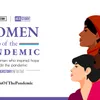The balancing act: What a year of the pandemic has meant for women entrepreneurs
From managing homes, ensuring the children are looked after, to simultaneously working harder than ever to grow their businesses, the COVID-19 pandemic, while tough on all, has been tougher on women entrepreneurs.
It’s 7 AM. While most of Kavita’s (name changed on request) family members are still breaking their slumber, her day is already in full swing.
Since 5 AM, Kavita has brewed a pot of coffee, answered several calls and emails, and simultaneously made breakfast for her family.

Image credit: Daisy
She also had to prepare her kids for their online classes while ensuring her next presentation is ready. Not just that. Kavita also has to ensure the kids are entertained, too, and don’t disturb her husband while he is on an important meeting.
Mornings are the busiest, she says, wishing when it would become easier on her. But the sad reality is, with the COVID-19 pandemic and work from home, many working women’s responsibilities have compounded.
Doubled efforts
“The onus of ensuring everyone is fed, the children are looked after, and my husband is not disturbed during meetings has automatically fallen on my shoulders. It isn’t like I don’t have help, but for small things — ensuring my son is entertained or keeping the coffee and snacks ready — and all of this, while I am running my business, is my responsibility,” Kavita says.
The pandemic has been tough on all. However, it has been significantly tougher on women entrepreneurs.
“When the pandemic first hit, nobody thought it would last for over a year. While running a business, along with running the house, can be done for a short time frame, an extended period of a year or more has adversely affected women entrepreneurs, CXOs, and executives,” says Madhura Dasgupta, Founder of AspireForHer.
With families at home, a woman’s needs end up taking a back seat. YourStory Research data has found that the COVID-19 pandemic, the subsequent lockdown, and severe restrictions on businesses have hit women entrepreneurs hard.
“A lot of times, leading a company and managing family and work together as a woman becomes a big issue. Luckily, my husband's support helped me breeze through the lockdown. However, I had to support several women in the company who were facing work-life balance issues. Many of them had children and joint families to support. For them, working from home was difficult. We, as a company, managed to help them by setting up various processes,” says Vaishali Gupta, Co-founder and Head of Brand Marketing, mCaffaine.
“Being able to work from home allowed me to give time to my health and myself, something I wasn't able to do while working at an office. I adopted new habits and learned new things that I always wanted to do,” she adds.
A global problem
This particular issue, much like the COVID-19 virus, is global, notes Silicon Valley tech entrepreneur Namrata Ganatra.
“Close to 100 percent of the people who quit their jobs in the US during the pandemic happened to be women,” says Namrata, Founder and CEO of Sturish.
And the problem is significantly higher among working parents.
Namrata explains that with children at home, the focus simply shifts. So, as a family, there is a choice to be made if either the husband or the wife take a step back from their respective careers. Unfortunately, in most cases, the women have taken a step back.
“Many early-stage founders have decided to shut their businesses or paused and resumed their businesses,” adds Madhura. In fact, many women-led startups scaled down their operations or pivoted the business model to stay afloat.
Sadly, women stepping back from work is culturally and socially accepted everywhere. “While fortunately I have had a strong support system, and many a time, my husband took on more load, many women don’t have that luxury,” Namrata says.
According to an AspireForHer report, women-owned businesses experienced an enormous decline in revenue. Close to 73 percent of women entrepreneurs were negatively impacted by the COVID-19 crisis, with almost 20 percent witnessing their business revenues wiped out.
Moreover, close to 35 percent experienced a significant decline (25 – 75 percent) in business revenues. In cases where businesses did not see an immediate revenue decline, growth remained mute.
Illustrator Alicia Souza says, “I've always worked from home, so adjusting to this new norm wasn't a challenge. I gave birth to my child in July 2020 in the middle of the pandemic. So life, in general, changed for me. The one notable difference was my weekends which I use to meet with people since my weekdays are occupied with work. My biggest work-life challenge remains to balance work and personal life after the birth of my child.”
Besides the work-life balance issue, YourStory Research data has found that funding for women-led startups fell almost 24 percent to $280 million in the first six months of 2020, compared to $369 million in the first half of 2019.
“I think it's harder to raise money, especially as a women entrepreneur, in general. But now, in a pandemic, everything has been remote and over zoom. This has made it even harder to raise money for everyone, but it's impacted women entrepreneurs even more. So I'd say that is the double penalty,” says Namrata.
Not all is bad
After an abrupt drop in March and April 2020 due to the nationwide lockdown, growth in businesses is at about one-third of pre–COVID-19 levels. Enterprises that experimented with or adopted digitalisation in various parts of their business model experienced the fastest recovery.
Despite the near-term decline, entrepreneurs are optimistic about the bounce back. Close to 90 percent of entrepreneurs believe they will be able to survive the crisis, of which two-thirds believe this requires major changes to their business model and cost structure.
Close to 80 percent of entrepreneurs expect demand to bounce back to pre-lockdown levels soon.
“From the start, working from home is a choice we made as a brand. We consciously tried not to have many fixed costs. Therefore, we opted to not have an office space and used Shopify's services to reach customers. Such decisions have ultimately helped us to navigate the pandemic. Now, working from home is a requirement. There are days where we face various mental challenges, but it also provides us with the freedom to work on our own time, balancing between personal and professional life,” Gayatri Mallika Bansal, Co-founder, THERE!, and a Shopify merchant, says.
For Vekuvolu Dozo, a loin loom weaver from Nagaland — who makes table runners, cushions, and placemats — online selling on social media helped her stay afloat.
An expert in the Naga motifs that represent heroic tales of their ancestors, nature, and traditional narratives, Vekuvolu says she learnt to use Instagram and WhatsApp to connect with buyers during her training with Antaran.
“During the lockdown, many weavers found it difficult to continue. Because I had learned digital selling through social media, they started seeking my help with their products. The business has boomed since then, and we have sold more during the pandemic than ever before. Our products are being liked and bought globally, including in Germany, Canada, and the UK. The pandemic has been an opportunity in disguise,” she shares.
Sharda Gautam, Head of Crafts, Tata Trusts, says, “Antaran’s approach has clearly shown that digital literacy is no longer a luxury, but a necessity. Female artisan entrepreneurs like Vekuvolu from Nagaland and Itishree from Odisha not just wove beautiful products but also acclaimed praises for their presentation and communication on social media platforms like Instagram.”
Notably, many women also became ‘chef-preneurs’ from the comfort of their homes, selling safe and tasty home-cooked food during the pandemic. On the other hand, women behind apparel startups branched out to manufacturing protective face masks and PPE kits.
(With inputs from Meha Agarwal, Rekha Balakrishnan, and Nagaraju)
Edited by Suman Singh









